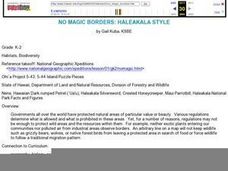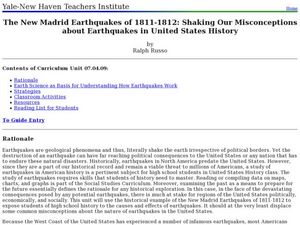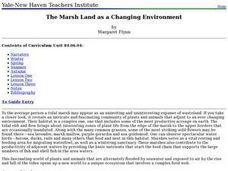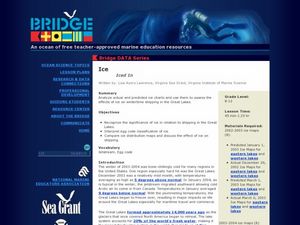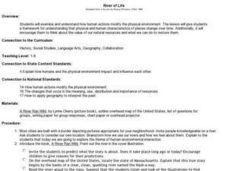Curated OER
No Magic Borders: Haleakala Style
Students discuss borders and boundaries. They discuss pollution and the fact that boundaries cannot stop pollution and that pollution affects even protected wildlife and plants. They participate in an activity in which they must place...
Curated OER
What's Your Temperature?
Learners take a look at the local newspaper and focus on the weather section. They get into small groups, and each one looks at the same map, but of a different part of the country. They must prepare a presentation that shows how...
Curated OER
North American Biomes
In this Science worksheet, learners color a biome map of North America. Students color the map by solving the clues listed on a separate sheet of paper.
Curated OER
No magic borders
Middle schoolers discuss what they have heard about pollution. They explore the purposes and limitations of political boundaries and borders and identify some of the causes and effects of pollution.
Curated OER
Biome Map
In this biomes worksheet, learners color the map of North America according to the biome clues. Students then answer questions about the North American biomes.
Curated OER
The New Madrid Earthquakes of 1811-1812: Shaking Our Misconceptions about Earthquakes in United States History
Students Examine how earthquakes work and what plate tectonics and fault lines are. For this earthquake lesson students complete an earthquake scavenger hunt.
Curated OER
Map on the Wall
Students examine the Ogallala aquifer water storage facility, identify rivers that refill the aquifer, and locate major cities near by. Students make maps of the area.
Curated OER
Coasts
Students explain the different types of marine coasts and where they are located in the United States and its territories. They explain and identify some of the life forms that inhabit different marine coastal regions.
Curated OER
The Marsh Land as a Changing Environment
Sixth graders continue their examination of the state of Connecticut. After taking a field trip, they identify the types of birds, plants, invertebrates and vertebrates who make their home in the salt marshes. In groups, they identify...
Curated OER
Iced In
Introduce junior oceanographers to ice conditions in The Great Lakes. The ice map links are no longer available, so you will not be able to have your class perform the mentioned data activity. You can, however, access the Canadian Ice...
Curated OER
Graphin' And Glyphin' Utah Weather
Fourth graders investigate the concepts of looking at sets of data. The focus of the study is upon the local weather of Utah. They study the weather found in the city and in the country and make comparisons based upon geographical location.
National First Ladies' Library
Are We There Yet?
Pupils study the wide-reaching effects of the Cold War, even to its involvement in domestic road construction. They research the National Defense Highway System (Eisenhower Highways) for information about the creation of the program, the...
Curated OER
Where Do I Live?
Students gain a better understanding of the population of the region they live in by comparing U.S. census data on the internet.
Curated OER
Climate Change in Canada
In this Canada worksheet, students read a 6 page detailed informational text about climate change in Canada. Students then complete 10 essay/short answer questions.
Curated OER
It's Not My Problem!
Young scholars examine how rivers flow through the country to sea level. Students study how upstream pollution effects the water and people downstream.
Curated OER
The Arctic Ocean
In this Arctic Ocean activity, students read a 2 page passage, then complete 10 true/false questions. Answers are included on page 4. A reference web site is given for additional activities.
Curated OER
Looking for Clues
Students infer the cause of a shipwreck based upon information about artifacts found in the wreck. In this marine archeology lesson, students use an inventory list to infer the cause of a shipwreck. Students discuss the maritime...
Curated OER
Environment: River of Life
Students assess the impact of human activity on the environment. After reading the book, "A River Ran Wild," they role-play and discuss how people changed the river. Students write stories about living along a river from the point of...
